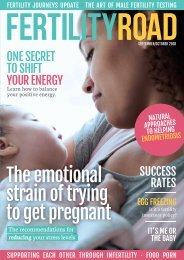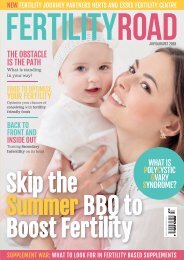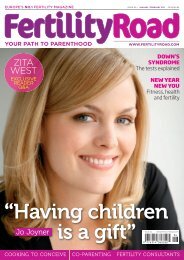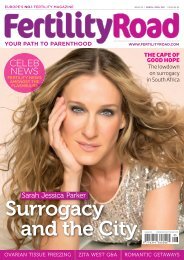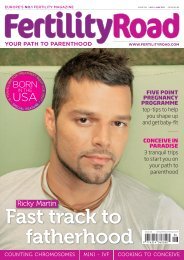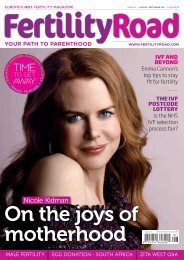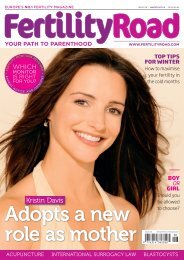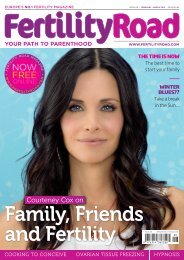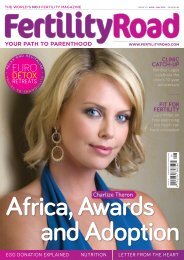Fertility Road Issue 03
Create successful ePaper yourself
Turn your PDF publications into a flip-book with our unique Google optimized e-Paper software.
FEATURE | worldwide web of fertility<br />
In real life, these women reveal themselves<br />
to be lawyers, doctors, army wives, teachers,<br />
engineers, policewomen and stay at home<br />
mothers, living in America, England, Europe,<br />
Africa, the Middle East - all of them sharing<br />
an insatiable hunger for knowledge about<br />
their own reproductive abilities and pregnancy<br />
chances. It’s a fascinating all-female world, and<br />
close friendships often arise.<br />
And frequently, the advice on fertility sites<br />
goes much further than that given by scientists.<br />
Take the legendary site peeonastick.com. A<br />
‘comprehensive collection of home pregnancy<br />
test and ovulation predictor test information<br />
and images’, this die-hard site catalogues the<br />
sensitivity of tests (officially versus anecdotally),<br />
has a wealth of unbelievably detailed information<br />
on how tests work scientifically, which goes far<br />
beyond what manufacturers think women need<br />
to know, and even publishes random experiments<br />
the author has done, for example, using breast<br />
milk instead of urine on a pregnancy test.<br />
It’s surely the best of times for any woman<br />
wanting to know more about fertility, but could<br />
there also be a risk of information overload and<br />
each other’s success stories. It has the<br />
advantage of being anonymous, and means<br />
you can be completely honest about what<br />
you’re going through, without sharing too<br />
much with real life friends.”<br />
Justine Roberts, co-founder of mumsnet.<br />
com, agrees. “Our TTC (trying to conceive)<br />
discussion boards are one of the busiest<br />
parts of Mumsnet. Out there in the real<br />
world, it can be hard to find people who are in the same situation<br />
as you but, each month on Mumsnet, a new load of people<br />
aiming for a BFP (big fat positive) join a discussion thread<br />
together and find somewhere safe and supportive to vent<br />
their frustrations, sharing at the same time information about<br />
what’s worked for them during the ups and downs of trying to<br />
have a baby.”<br />
On fertility site message boards, women have posted signatures<br />
which express their desperation to conceive, perhaps even at a<br />
certain time and a certain gender (‘swaying for blue in September<br />
2011’) or their memories of babies lost in miscarriage (‘Jay: 10<br />
weeks in my womb; forever in my heart’). They have cartoon<br />
‘tickers’ which show other posters where they are in their cycle:<br />
the 30 days might be illustrated by a long, winding road, and the<br />
point they are at by an egg hatching, or a cradle.<br />
It’s a strange new world, light years away from the whispered<br />
conversations women had only a generation ago when, without<br />
the internet, infertility was something discussed discretely with<br />
your doctor and closest friends, and there were only a few books<br />
to guide you. On fertilityfriend.com, each woman’s cycle graphs<br />
are added to a vast ‘chart gallery’ where women can ‘overlay’<br />
their own chart with others’, or search for others who have<br />
similar charts to them (right down to intercourse pattern and pre<br />
and post ovulatory temperatures) and got pregnant.<br />
It’s surely the best of times for any<br />
woman wanting to know more about<br />
fertility, but could there also be a risk of<br />
information overload and old wives’ tales?<br />
old wives’ tales? Online posters hotly debate the possible fertility<br />
benefits of everything from drinking grapefruit juice to increase<br />
cervical mucus, to using an ‘instead cup’ to hold semen close to<br />
the cervix. But who can you trust? There’s very little advice<br />
available online from appropriately qualified doctors, and even<br />
when you do take the trouble to sift through all the sites written<br />
by amateurs to find those written by medical professionals, the<br />
information you find often conflicts with that from another site.<br />
Too much ‘fertility surfing’ can also lead to an unhelpful level<br />
of preoccupation that takes over hours of the day, every day.<br />
Surrounded by online friends who are equally obsessed, it’s easy<br />
to lose your sense of perspective to a point where if someone<br />
asks you what day it is, your first thought is ‘seven dpo [days post<br />
ovulation]’.<br />
Jane’s story (not her real name) illustrates both sides of the<br />
coin. She and her partner were trying artificial insemination at<br />
home. “It didn’t cross my mind at first to ask my GP how to do it,”<br />
she says – “I was too embarrassed!”<br />
It was much easier to search for information online - she found<br />
some encouraging success stories and bought a kit containing<br />
some syringes, sample pots and instructions. It was only after three<br />
months of unsuccessfully following the instructions that Jane<br />
found the courage to ask her GP if this could really work - and<br />
he explained that the instructions in the kit were incorrect. »<br />
© Yuri Arcurs / iStockphoto.com<br />
44 fertility road | november - december



